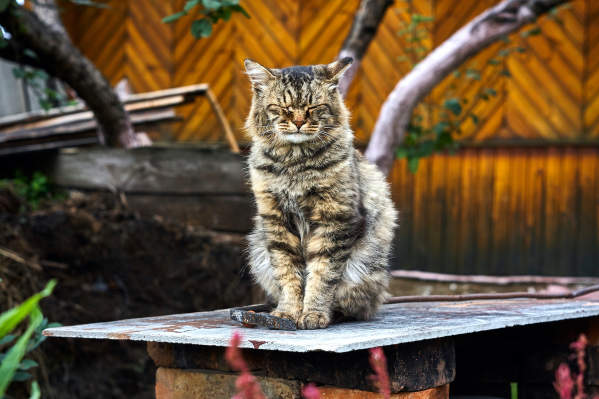One of the best parts of having a pet cat is that they can live for many years alongside you. It can be incredibly fulfilling to watch your furry friend go from a playful little kitten to an independent, loving adult cat, and then a precious—albeit slower—senior.
The average indoor cat lives for about 10 to 15 years and has different needs and wants throughout their lifertime. Luckily, as your cat gets older, there’s plenty you can do to help them feel loved and cared for. Start with these steps.
How to take care of a senior cat
1. Go to the vet more often
It’s important to schedule regular checkups for your cat, as vets can catch conditions that are not yet problematic, but can become an issue if not treated.
Vets can also help administer regular preventative treatments that help cats avoid serious health problems as they age. Parasite prevention in cats is also a large concern, and there are vaccinations that cats should receive on a periodic basis.
2. Give them a cozy place to sleep
A senior cat requires lots of rest. Cats like curling up in warm spots, and as they get older and lose weight, they are particularly fond of areas that will keep them nice and toasty. Try to keep them away from doors, windows, hallways, and other drafty spots that are cooler than the rest of the house.
3. Keep their toys close by
Senior cats can't jump and play like younger cats can, so make sure you keep your cat's toys somewhere they can easily access. You may need to make accommodations by doing things like building ramps so your cat can climb to get to their favorite things or spots.
4. Make the litter box more accessible
If the litter box is hard to reach or hidden away, it may be hard for your senior cat to get to it, especially if your cat has arthritis.
Move the litter box somewhere that is easily accessible to increase the chances that your senior cat will use the litter box instead of other places around your home. If your cat starts eliminating anywhere other than the litter box, there is a good chance they may have a serious health problem. Be sure to consult with your vet.
5. Help them groom
Your cat was probably pretty good at taking care of their own fur and grooming themselves for most of their life. However, as cats age, grooming becomes more difficult, so you may have to lend a helping hand.
Be gentle—get a brush specifically designed for cats and gently brush your cat's hair to avoid matting and knots. Brushing them can also help remove loose hair and stimulate circulation to their skin, which can help keep the skin and coat healthy, too.
6. Switch to senior-specific cat food
Many pet parents feed their cats dry cat food, a cost-efficient option that has a pretty long shelf-life. However, as a cat ages, its nutritional needs change, along with its biological capabilities. For that reason, it can be helpful to switch your cat to a senior-specific food. Ask your vet for their recommendation based on your cat’s symptoms or any health conditions they have.
You may want to consider wet food for your aging cat—especially if your cat has kidney issues. Cats' lives can certainly be extended by feeding them a senior- or kidney-friendly diet as they get older. It's also advised to encourage them to drink extra amounts of water.
Helping your cat stay healthy as they age doesn’t have to be a difficult task. Providing your cat with proper care and showering them with love and affection can actually help extend their life. Just be sure to pay attention to and address your cat’s specific needs as they age, so you can make the most out of your cat’s senior years.
If you have questions about how to care for your senior cat, the Vet Pros at Pawp are here to help.
